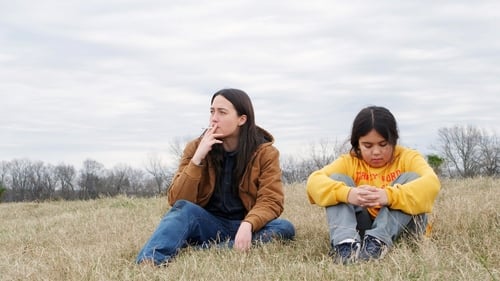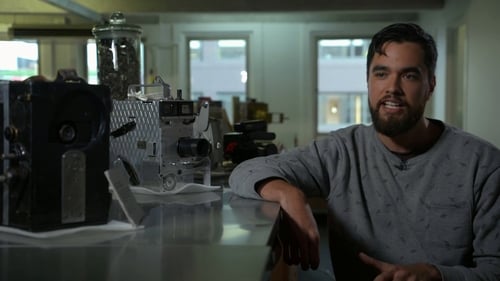
Sterlin Harjo
출생 : 1979-11-14,
약력
Sterlin Harjo is a member of the Seminole Nation and has Muskogee heritage. He was raised in Holdenville, Oklahoma and attended the University of Oklahoma, where he studied art and film.
He received a fellowship from the Sundance Institute in 2004. His short film, Goodnight, Irene, premiered at the 2005 Sundance Film Festival and received a special jury award at the Aspen Shortfest. In 2006, he received a fellowship from the newly formed United States Artists foundation.
Harjo's first feature film, Four Sheets to the Wind, tells the story of a young Seminole man who travels from his small hometown to Tulsa to visit his sister after the death of their father. The film premiered at the 2007 Sundance Film Festival where it was nominated for the grand jury prize. Harjo was named best director at the 2007 American Indian Film Festival. Harjo's second feature, Barking Water, premiered at the 2008 Sundance Film Festival. It portrays a road trip by a dying man and his former lover across Oklahoma to see his daughter and granddaughter in Wewoka, the capital of the Seminole Nation. Barking Water was named best drama film at the 2009 American Indian Film Festival. Harjo's first feature documentary, This May Be the Last Time, is based on the story of Harjo's grandfather, who disappeared in 1962 in theSeminal County town of Sasakwa. It explores the subject of Creek Nation hymns and their connection to Scottish, folk, gospel and rock music. The film premiered at the 2014 Sundance Film Festival.
His third feature film, Mekko, a thriller set in Tulsa, premiered at the Los Angeles Film Festival in June 2015. Mekko paints the portrait of a homeless Native American parolee who seeks to save his chaotic yet beautiful community from the darkness that threatens it. Harjo has also directed a number of short-form projects. His 2009 short film Cepanvkuce Tutcenen (Three Little Boys) was part of the Embargo Collective project commissioned by the imagineNative Film + Median Arts Festival.
He has directed a series of shorts for This Land Press in Tulsa, where Harjo is the staff video director. He was a member of the 2010 Sundance shorts competition jury.
Harjo is a founding member of a five-member Native American comedy group, The 1491s.
He also is one of the directors of Cherokee Nation’s monthly television news magazine, Osiyo, Voices of the Cherokee People, which is produced by Fire Thief Productions, a Native American production company which he co-founded with Cherokee photographer, Jeremy Charles.

Himself
Indigenous people have been misrepresented in film since the beginning of the Classic Hollywood Era, and people believe that Native Americans have vanished. We Are Still Here.

Cinematography
Filmmaker Sterlin Harjo follows Native artists for a year as they navigate their careers in the US and abroad. The film explores the immense complexities each artist faces concerning their own identity as Native artists, as well as pushing further Native art into a post-colonial world.

Editor
Filmmaker Sterlin Harjo follows Native artists for a year as they navigate their careers in the US and abroad. The film explores the immense complexities each artist faces concerning their own identity as Native artists, as well as pushing further Native art into a post-colonial world.

Producer
Filmmaker Sterlin Harjo follows Native artists for a year as they navigate their careers in the US and abroad. The film explores the immense complexities each artist faces concerning their own identity as Native artists, as well as pushing further Native art into a post-colonial world.

Director
Filmmaker Sterlin Harjo follows Native artists for a year as they navigate their careers in the US and abroad. The film explores the immense complexities each artist faces concerning their own identity as Native artists, as well as pushing further Native art into a post-colonial world.

Producer
야심찬 아파치 요리사부터 재능 있는 라코타 고등학교 학생까지, 개더는 대량 학살로 황폐해진 정신적, 문화적 정체성과 다시 연결하려는 성장 운동의 최전선에 있는 원주민들의 이야기를 따라간다. 함께, 그들은 고대의 음식 문화를 되찾고 회복하는 것이 어떻게 미국 원주민들에게 건강과 활력을 되찾을 수 있는 진보적인 방법인지를 보여준다.

Producer
The lives of a Native woman and a troubled young boy intersect over the course of a school day on a reservation in Oklahoma.

Self
A documentary portrait of the pioneering indigenous filmmaker and activist Merata Mita and an intimate tribute from a son about his mother that delves into the life of the first woman from an Indigenous Nation to solely direct a film anywhere in the world. Known as the grandmother of Indigenous cinema, Merata’s independent political documentaries of the 1970s and 80s highlighted injustices for Māori people and often divided the country. Mita was fearless in her life, her activism and her art. Chronicling the director’s journey to decolonize the film and television screens of New Zealand and the world, the film documents her work, her early struggles with her family and her drive for social justice that often proved personally dangerous.

Director
Native American actor Martin Sensmeier travels to San Juan County, Utah, to investigate the controversy over the Bears Ears National Monument. While there, he learns how the fight over the monument is just one more battle in a long-running war between the county's Native American citizens and their Mormon neighbors over who will control the future of the county. His journey reveals how voting rights denied by the Mormons have led to the marginalization of their Native neighbors and learns about the long history of looting of sacred archeological sites in the county.

Filmmaker
Native American actor Martin Sensmeier travels to San Juan County, Utah, to investigate the controversy over the Bears Ears National Monument. While there, he learns how the fight over the monument is just one more battle in a long-running war between the county's Native American citizens and their Mormon neighbors over who will control the future of the county. His journey reveals how voting rights denied by the Mormons have led to the marginalization of their Native neighbors and learns about the long history of looting of sacred archeological sites in the county.

Producer
Mekko gets out of prison after 19 years. He has no home or family so he makes his way to Tulsa. He tries to connect with a cousin but she turns him away. With nowhere to go Mekko ends up sleeping on the streets. He is taken in by the homeless native community. At times jovial, there is a dark undercurrent to the community. He begins having issues with a man named Bill. Bill is pure evil. Convinced that this man is a witch, Mekko turns to the old teachings of his grandmother in order to rid the community of this 'witch'. It's a story of redemption, and hope. Mekko is in search of his home and the strength to forgive himself of his past.

Writer
Mekko gets out of prison after 19 years. He has no home or family so he makes his way to Tulsa. He tries to connect with a cousin but she turns him away. With nowhere to go Mekko ends up sleeping on the streets. He is taken in by the homeless native community. At times jovial, there is a dark undercurrent to the community. He begins having issues with a man named Bill. Bill is pure evil. Convinced that this man is a witch, Mekko turns to the old teachings of his grandmother in order to rid the community of this 'witch'. It's a story of redemption, and hope. Mekko is in search of his home and the strength to forgive himself of his past.

Director
Mekko gets out of prison after 19 years. He has no home or family so he makes his way to Tulsa. He tries to connect with a cousin but she turns him away. With nowhere to go Mekko ends up sleeping on the streets. He is taken in by the homeless native community. At times jovial, there is a dark undercurrent to the community. He begins having issues with a man named Bill. Bill is pure evil. Convinced that this man is a witch, Mekko turns to the old teachings of his grandmother in order to rid the community of this 'witch'. It's a story of redemption, and hope. Mekko is in search of his home and the strength to forgive himself of his past.

Cinematography
카마라는 어린 딸 마냐와 집에서 키우던 염소 한 마디를 데리고 주도인 심라로, 그리고 델리로 남편을 찾는 여정을 떠난다. 저명한 여배우 지투 모한다스의 감독 데뷔작으로 그녀는 로드 무비와 서서히 진행되는 스릴러가 결합한 이 영화에 현대 인도 노동자 계급에서 느껴지는 불안한 감정을 담아낸다.

Producer
카마라는 어린 딸 마냐와 집에서 키우던 염소 한 마디를 데리고 주도인 심라로, 그리고 델리로 남편을 찾는 여정을 떠난다. 저명한 여배우 지투 모한다스의 감독 데뷔작으로 그녀는 로드 무비와 서서히 진행되는 스릴러가 결합한 이 영화에 현대 인도 노동자 계급에서 느껴지는 불안한 감정을 담아낸다.

Director
카마라는 어린 딸 마냐와 집에서 키우던 염소 한 마디를 데리고 주도인 심라로, 그리고 델리로 남편을 찾는 여정을 떠난다. 저명한 여배우 지투 모한다스의 감독 데뷔작으로 그녀는 로드 무비와 서서히 진행되는 스릴러가 결합한 이 영화에 현대 인도 노동자 계급에서 느껴지는 불안한 감정을 담아낸다.

Screenplay
Frankie is dying. Irene hasn't forgiven him. And they are racing against time to find their way home. Frankie needs help and Irene is the one he turns to. He must go home one last time. And, like so many times before, Irene is extending herself beyond her common sense. The two set out on a journey that becomes more than getting home; confronting the past, love, understanding, and self discovery. Barking Water is a tale of great love that looks at what brings us all together. It's a tale of home...and what it takes to get there.

Director
Frankie is dying. Irene hasn't forgiven him. And they are racing against time to find their way home. Frankie needs help and Irene is the one he turns to. He must go home one last time. And, like so many times before, Irene is extending herself beyond her common sense. The two set out on a journey that becomes more than getting home; confronting the past, love, understanding, and self discovery. Barking Water is a tale of great love that looks at what brings us all together. It's a tale of home...and what it takes to get there.

Writer
After his father's untimely suicide, Cufe leaves his home in a Native American reservation in search of a more fulfilling life.

Director
After his father's untimely suicide, Cufe leaves his home in a Native American reservation in search of a more fulfilling life.

Writer
Some things are worth the wait.

Director
Some things are worth the wait.







